Juho Pohjalainen's Blog: Pankarp - Posts Tagged "dwarves"
Orcs - Fantasy, Racial Familiarity, and Mundanity
I've seen a lot of discourse about fantasy racism these past couple days, especially with the context of orcs. This got me thinking about such racial matters in general. I thought I'd throw in my own two cents.
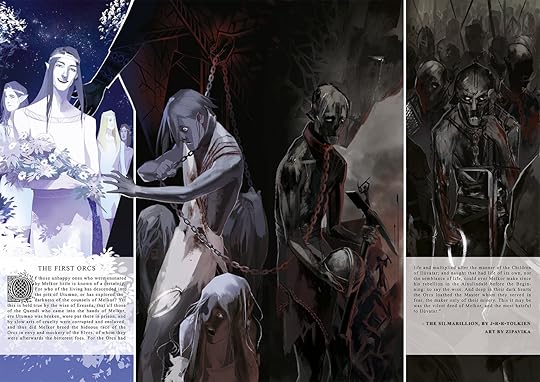
Tolkien - the father of modern fantasy - spawned his nonhuman races out of the old human mythology, fairy tales, and shared consciousness. Elves were like humans except far more magical and spiritually connected to the world; orcs were then the result of basically Lucifer himself getting his grubby hands on some elves; dwarves were the creation of a different god, dwellers under the earth, resilient as stone and greedy for gold and other shining metals; finally, the hobbits just sort of showed up, pudgy little folk with a love for idyllic life and peace, the closest to regular human. Some of them had in common with real-life nationalities and cultures - according to Tolkien himself, dwarves have more than a touch of Jewish in them, orcs Mongolian, and hobbits of course are basically British countryside dwellers - but these had a fairly minor role in their creation, helped by the man himself disliking allegory. All of them were also quite insular and had little to do with the businesses of other races: the Council of Elrond, the races coming together to address a grave issue, was an anomaly that was noted in-universe. On the whole they had strongly mythical roots, and drip with magical and fantastic flavour. All was well.
Then Dungeons & Dragons poached them into its great big fantasy patchwork. Now any player could roll up an elf, a dwarf, or ahobbi halfling; and every DM liked to use orcs as their basic mooks. Half-elves were codified into a race of their own, and soon after, so were the half-orcs... with fairly disturbing implications for the latter, at first. Gnomes were brought along from elsewhere, the enemy ranks swelled with kobolds and gnolls and others, and soon the world teemed with all manner of fantasy races great and small - and they quickly grew a familiar, even a mundane, sight in any fantasy setting.

And once you grow familiar with something, the next step is to explore and expand - to stretch its definitions, to ponder its identity, and to deconstruct what it all means. It didn't take long before the players wanted to be the orc rather than kill it, be it in a game of flipped perspectives where the whole party took up the role of the bad guys, or as a singular heroic individual who's fled home and wants to do good things, or a half-orc whose parents actually loved one another, or an orc wizard, or really just about anything else. At this stage, your imagination is the limit.
By now it seems like D&D's become the new standard bearer of fantasy - the introduction of the concept for most people, the originator of new ideas, and the wellspring of new fantasy and literature. It's next to impossible to write a fantasy story without it having been influenced by D&D in some way or the other - either by embracing it, or by consciously rejecting it. In it, magic and fantasy are a pretty standard fare, all over the place and accessible to everyone. The new races it added later on - genasi, tiefling, and dragonborn among others - followed this trend, each having their cultures and their nations and each blending in with humans just fine. It all tends towards the melting-pot feel, very much a modern concept... and indeed tied to modern sensibilities and attitudes in many other ways as well, the interpretations of morality and good and evil, the ideas of equality and inclusiveness.
All of this finally culminates to the topic of the present - racism. The big question on everyone's lips is, are orcs racist? Do they have to be racist? How to fix it?
But I reject these, and instead bring forth a whole other issue: What difference is there between these races, and plain old humans? How are they not just humans with tusks or pointed ears and other meaningless window-dressing?

The metamorphosis - the mundanization - is now complete. Through the twists and branches of a hundred-year-old evolutionary tree, the roots of mythology are now forgotten. Through intense familiarization and numerous deconstructions and parodies, the magic and fantasy is lost. "Fantasy" is no longer a description, but a genre, with medieval technology and various squat bearded and pointy-eared and green tusked people. The "orc" is no longer a strange mythical horror, he's your neighbour. The cultural counterparts and allegories, once a minor footnote, have grown to the forefront of their identity - because at this point, what else is there?
This is the great underlying issue for me - the dragon that gnaws at the tree of fantasy. I solve it by taking several big steps back. I grab all the nonhuman races and hide them back into the corners of the earth. You have to go looking for them, and therefore they remain fantastic and weird.

But where Tolkien tapped into mythology for his inspiration, I tend to look outward, into the realm of science fiction. My races tend to be substantially more different from humans, with many physical and mental traits that we might find utterly alien, just as they would never understand many facets of humanity.
Peal is not human, and I emphasize this inhumanity whenever it would be relevant. His size, his senses, his natural habitat, the faiths and superstitions drummed into him as a youth, all serve to separate him from humanity even after he's spent many years living among us. He still considers us weird or disgusting in many ways, while we in turn often find his way of thinking difficult to understand. It is a constant theme in the stories starring him - how humans might be viewed from an outsider's perspective.
I still have elves and orcs around, but you're not going to see them any more than you're going to see bugbears, which is very little indeed. I hope that I can maintain their fantastic elements forevermore.
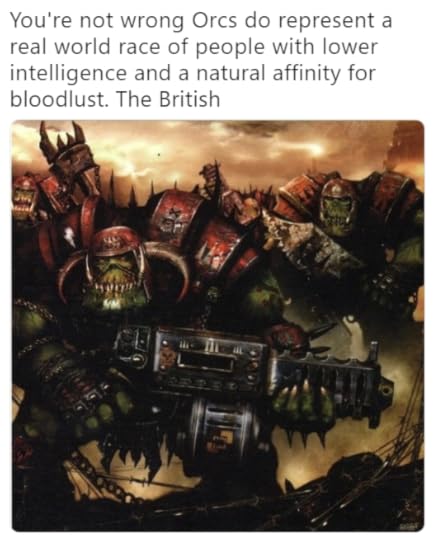

Tolkien - the father of modern fantasy - spawned his nonhuman races out of the old human mythology, fairy tales, and shared consciousness. Elves were like humans except far more magical and spiritually connected to the world; orcs were then the result of basically Lucifer himself getting his grubby hands on some elves; dwarves were the creation of a different god, dwellers under the earth, resilient as stone and greedy for gold and other shining metals; finally, the hobbits just sort of showed up, pudgy little folk with a love for idyllic life and peace, the closest to regular human. Some of them had in common with real-life nationalities and cultures - according to Tolkien himself, dwarves have more than a touch of Jewish in them, orcs Mongolian, and hobbits of course are basically British countryside dwellers - but these had a fairly minor role in their creation, helped by the man himself disliking allegory. All of them were also quite insular and had little to do with the businesses of other races: the Council of Elrond, the races coming together to address a grave issue, was an anomaly that was noted in-universe. On the whole they had strongly mythical roots, and drip with magical and fantastic flavour. All was well.
Then Dungeons & Dragons poached them into its great big fantasy patchwork. Now any player could roll up an elf, a dwarf, or a

And once you grow familiar with something, the next step is to explore and expand - to stretch its definitions, to ponder its identity, and to deconstruct what it all means. It didn't take long before the players wanted to be the orc rather than kill it, be it in a game of flipped perspectives where the whole party took up the role of the bad guys, or as a singular heroic individual who's fled home and wants to do good things, or a half-orc whose parents actually loved one another, or an orc wizard, or really just about anything else. At this stage, your imagination is the limit.
By now it seems like D&D's become the new standard bearer of fantasy - the introduction of the concept for most people, the originator of new ideas, and the wellspring of new fantasy and literature. It's next to impossible to write a fantasy story without it having been influenced by D&D in some way or the other - either by embracing it, or by consciously rejecting it. In it, magic and fantasy are a pretty standard fare, all over the place and accessible to everyone. The new races it added later on - genasi, tiefling, and dragonborn among others - followed this trend, each having their cultures and their nations and each blending in with humans just fine. It all tends towards the melting-pot feel, very much a modern concept... and indeed tied to modern sensibilities and attitudes in many other ways as well, the interpretations of morality and good and evil, the ideas of equality and inclusiveness.
All of this finally culminates to the topic of the present - racism. The big question on everyone's lips is, are orcs racist? Do they have to be racist? How to fix it?
But I reject these, and instead bring forth a whole other issue: What difference is there between these races, and plain old humans? How are they not just humans with tusks or pointed ears and other meaningless window-dressing?

The metamorphosis - the mundanization - is now complete. Through the twists and branches of a hundred-year-old evolutionary tree, the roots of mythology are now forgotten. Through intense familiarization and numerous deconstructions and parodies, the magic and fantasy is lost. "Fantasy" is no longer a description, but a genre, with medieval technology and various squat bearded and pointy-eared and green tusked people. The "orc" is no longer a strange mythical horror, he's your neighbour. The cultural counterparts and allegories, once a minor footnote, have grown to the forefront of their identity - because at this point, what else is there?
This is the great underlying issue for me - the dragon that gnaws at the tree of fantasy. I solve it by taking several big steps back. I grab all the nonhuman races and hide them back into the corners of the earth. You have to go looking for them, and therefore they remain fantastic and weird.

But where Tolkien tapped into mythology for his inspiration, I tend to look outward, into the realm of science fiction. My races tend to be substantially more different from humans, with many physical and mental traits that we might find utterly alien, just as they would never understand many facets of humanity.
Peal is not human, and I emphasize this inhumanity whenever it would be relevant. His size, his senses, his natural habitat, the faiths and superstitions drummed into him as a youth, all serve to separate him from humanity even after he's spent many years living among us. He still considers us weird or disgusting in many ways, while we in turn often find his way of thinking difficult to understand. It is a constant theme in the stories starring him - how humans might be viewed from an outsider's perspective.
I still have elves and orcs around, but you're not going to see them any more than you're going to see bugbears, which is very little indeed. I hope that I can maintain their fantastic elements forevermore.

Race and Race - Scattered Thoughts on Brown Elves
I'm sure we all have our own opinions on the new Rings of Power stuff presented to us recently. We've had a lot to talk about. Many things we feel strongly about. To me it's giving plenty food for thought in regards of setting and worldbuilding, and nonhuman races, and how far they reach and where you might find them.
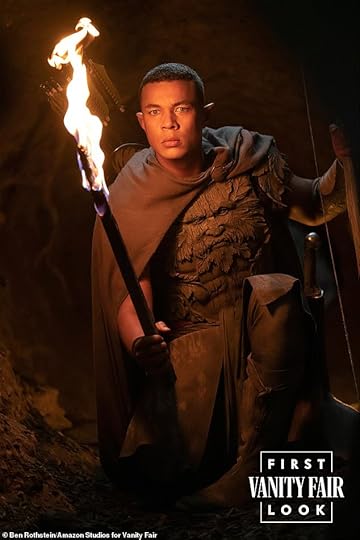
So what's with this guy? Where'd he come from, in the grand worldly scheme of things? I'm guessing Near Harad, is where him or his parents or grandparents originate: he doesn't seem quite dark-complexioned enough to have his origins in Far Harad or beyond, though I might be wrong.
After the Awakening of Elves, far in the Years of the Trees, they of course split up with some choosing to follow Oromë into Valinor, and others opting to remain behind in the land of starlight. Others still were caught by Melkor and ended up twisted into orcs. But suppose that doesn't account for all of them?
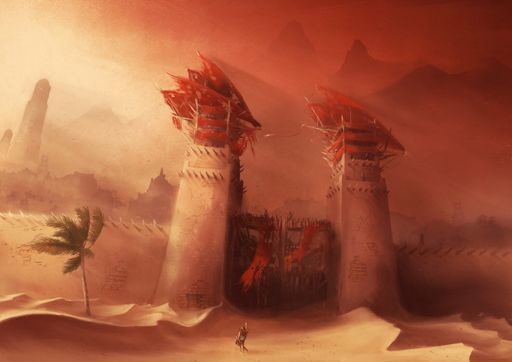
Suppose some of them - such as Arondir's ancestors - wandered south instead, to the lands of vast prairies and hot sun and bloody hugeass elephants, and here they made themselves a home? And over time, they began to adjust to the new environment, same as migrating humans adjusted to theirs? (Although in the real world it was rather the opposite, since we came from the south rather than going there, but you get what I mean.)
And I'm not just talking about Middle-Earth here. More generally, you can apply the same line of thought to just about any fantasy setting. Humans in these worlds have migrated all across the globe, so why not elves as well? Or dwarves, or halflings, or even orcs? Spread out in prehistory, filled the earth, and diverged a little bit? And there, you've got your new fantasy setting all covered!
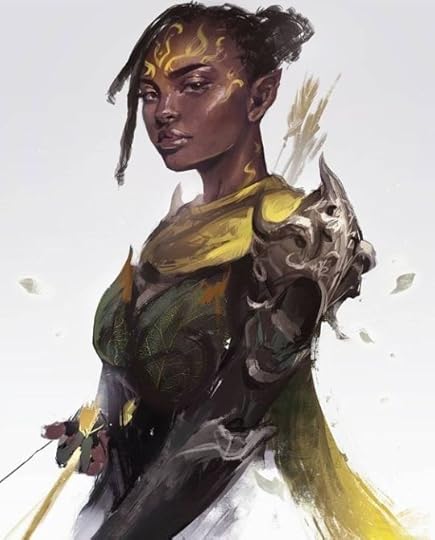
Trouble is, fantasy typically doesn't operate on long enough timeframes for this diversity to kick in. You've got your Mythic Ages and Golden Ages, your Ancient Empires, all having taken place thousands or at most tens of thousands of years ago. It took longer than that for the current major racial groups to form - and elves and dwarves, with their significantly greater lifespans, would take a longer time still. And it'd raise further questions about going backwards along the line: not about how they formed the way they did, but where did elves and dwarves come from in the first place? How did they evolve, differ from humanity? Or did humanity differ from them? And what could have prompted the outrageously varying lifespans?
Or maybe they're aliens? Visitors from space, that landed here (or crash-landed) eons ago when ancestors of man still lived in trees. The different ethnicities could have come from different ships, different areas from their old homeworld, explaining their differences... or they might have had the time to evolve and diversify in their new home, before the present day. And the orcs were of course an ancient bioweapon that got loose and made a mess of the local ecosystem.
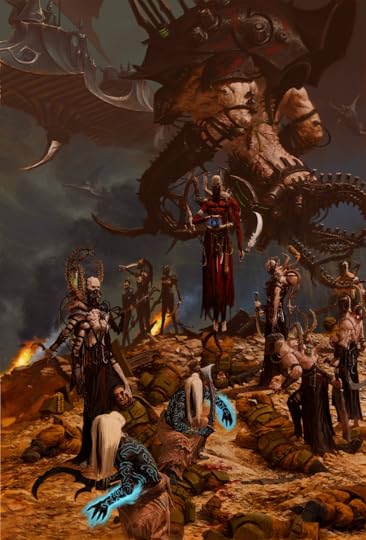
We've drifted pretty deep in the realm of science fiction now. That's not necessarily a bad thing - I like to mix the two a lot myself - but I get the feeling it's not what Tolkien was going for. So let's wind back a little and look at this whole thing from a mythological standpoint.
Creation myths! Divine meddling upon a virgin earth! Forming this ball out of a bunch of space-stones, then seeding the planet with all varieties of life! (They might even be aliens themselves, masters of genetic engineering, but that's going back to scifi so I'mma stop here.) Elves usually came first out of the oven, shortly before or after things such as dragons and serpentmen and other weirder things, followed by dwarves, then finally men.
And why would these gods stick to just one geographical location? And as they spread around, why wouldn't they experiment a little bit, tweak their core design to better suit the environment they stick them in? Pale elves up north, dark elves in the south to the realm of high burning sun, for instance. That'd work out just fine, wouldn't it?
But think of it... these other realms, other kingdoms and continents, would have their own myths. Their own gods and heroes, their own strange nonhuman beings lurking in the fringes of the earth. In the east, the Yokai. In the far south, the Tikoloshe or Hili. Just to name a couple examples. Elves, dwarves, and the gods that created them, hold dominion just over the relatively small land of Europe. To spread farther than that, they'd have to...

Just try and imagine it - conquering pantheon emerges on the shores, exterminates the local gods, puts to torch their worshipers, smashes their idols, then in the place of all these things spreads out their own creatures, just ever so slightly changed for the sake of diversity... when in truth, what they're doing is homogenizing things. Make it all look the exact same, just with different amounts of skin pigmentation. One myth to rule them all. All of a sudden it sounds pretty ugly.
Mind you, you could do a lot with that idea. A great epic divine war, the gods of one realm seeking to invade another. Or if you don't feel like it, then you might want to think about diversifying in the other direction: if you bring elves to the jungles of the Darkest Africa, then some of those jungle creatures might end up moving to the cold north. Sort of a great fantasy cultural exchange program. But I'm not sure I like that idea very much: it makes all of the realms look less unique, more of the same, the same way in the real world all the nations have started to blend together into one big capitalistic mass of grey towers and fast food joints.

No, I think I'd much rather keep things as different as possible. It's fantasy, after all: filled with strange alien realms where few people have gone and where nothing is the same, and with all manner of creatures living in the deep woods and dark caves and desolate mountaintops. Always keep things fantastic. Always keep things different. Instead of spreading out elves everywhere, look into the myths and tales of these other cultures, and tap from those. You'll get so much more out of your tales that way, I think.
But perhaps there's one last explanation - one final way to make everything work. Perhaps Eru Illúvatar simply likes to play with colors. He's put a few brown elves and black dwarves here and there, purely for the sake of variety. And if this were the case, then I must ask...

Where are the Pink Elves?

So what's with this guy? Where'd he come from, in the grand worldly scheme of things? I'm guessing Near Harad, is where him or his parents or grandparents originate: he doesn't seem quite dark-complexioned enough to have his origins in Far Harad or beyond, though I might be wrong.
After the Awakening of Elves, far in the Years of the Trees, they of course split up with some choosing to follow Oromë into Valinor, and others opting to remain behind in the land of starlight. Others still were caught by Melkor and ended up twisted into orcs. But suppose that doesn't account for all of them?

Suppose some of them - such as Arondir's ancestors - wandered south instead, to the lands of vast prairies and hot sun and bloody hugeass elephants, and here they made themselves a home? And over time, they began to adjust to the new environment, same as migrating humans adjusted to theirs? (Although in the real world it was rather the opposite, since we came from the south rather than going there, but you get what I mean.)
And I'm not just talking about Middle-Earth here. More generally, you can apply the same line of thought to just about any fantasy setting. Humans in these worlds have migrated all across the globe, so why not elves as well? Or dwarves, or halflings, or even orcs? Spread out in prehistory, filled the earth, and diverged a little bit? And there, you've got your new fantasy setting all covered!

Trouble is, fantasy typically doesn't operate on long enough timeframes for this diversity to kick in. You've got your Mythic Ages and Golden Ages, your Ancient Empires, all having taken place thousands or at most tens of thousands of years ago. It took longer than that for the current major racial groups to form - and elves and dwarves, with their significantly greater lifespans, would take a longer time still. And it'd raise further questions about going backwards along the line: not about how they formed the way they did, but where did elves and dwarves come from in the first place? How did they evolve, differ from humanity? Or did humanity differ from them? And what could have prompted the outrageously varying lifespans?
Or maybe they're aliens? Visitors from space, that landed here (or crash-landed) eons ago when ancestors of man still lived in trees. The different ethnicities could have come from different ships, different areas from their old homeworld, explaining their differences... or they might have had the time to evolve and diversify in their new home, before the present day. And the orcs were of course an ancient bioweapon that got loose and made a mess of the local ecosystem.

We've drifted pretty deep in the realm of science fiction now. That's not necessarily a bad thing - I like to mix the two a lot myself - but I get the feeling it's not what Tolkien was going for. So let's wind back a little and look at this whole thing from a mythological standpoint.
Creation myths! Divine meddling upon a virgin earth! Forming this ball out of a bunch of space-stones, then seeding the planet with all varieties of life! (They might even be aliens themselves, masters of genetic engineering, but that's going back to scifi so I'mma stop here.) Elves usually came first out of the oven, shortly before or after things such as dragons and serpentmen and other weirder things, followed by dwarves, then finally men.
And why would these gods stick to just one geographical location? And as they spread around, why wouldn't they experiment a little bit, tweak their core design to better suit the environment they stick them in? Pale elves up north, dark elves in the south to the realm of high burning sun, for instance. That'd work out just fine, wouldn't it?
But think of it... these other realms, other kingdoms and continents, would have their own myths. Their own gods and heroes, their own strange nonhuman beings lurking in the fringes of the earth. In the east, the Yokai. In the far south, the Tikoloshe or Hili. Just to name a couple examples. Elves, dwarves, and the gods that created them, hold dominion just over the relatively small land of Europe. To spread farther than that, they'd have to...

Just try and imagine it - conquering pantheon emerges on the shores, exterminates the local gods, puts to torch their worshipers, smashes their idols, then in the place of all these things spreads out their own creatures, just ever so slightly changed for the sake of diversity... when in truth, what they're doing is homogenizing things. Make it all look the exact same, just with different amounts of skin pigmentation. One myth to rule them all. All of a sudden it sounds pretty ugly.
Mind you, you could do a lot with that idea. A great epic divine war, the gods of one realm seeking to invade another. Or if you don't feel like it, then you might want to think about diversifying in the other direction: if you bring elves to the jungles of the Darkest Africa, then some of those jungle creatures might end up moving to the cold north. Sort of a great fantasy cultural exchange program. But I'm not sure I like that idea very much: it makes all of the realms look less unique, more of the same, the same way in the real world all the nations have started to blend together into one big capitalistic mass of grey towers and fast food joints.

No, I think I'd much rather keep things as different as possible. It's fantasy, after all: filled with strange alien realms where few people have gone and where nothing is the same, and with all manner of creatures living in the deep woods and dark caves and desolate mountaintops. Always keep things fantastic. Always keep things different. Instead of spreading out elves everywhere, look into the myths and tales of these other cultures, and tap from those. You'll get so much more out of your tales that way, I think.
But perhaps there's one last explanation - one final way to make everything work. Perhaps Eru Illúvatar simply likes to play with colors. He's put a few brown elves and black dwarves here and there, purely for the sake of variety. And if this were the case, then I must ask...

Where are the Pink Elves?
Pankarp
Pages fallen out of Straggler's journal, and others.
Pages fallen out of Straggler's journal, and others.
...more
- Juho Pohjalainen's profile
- 352 followers



